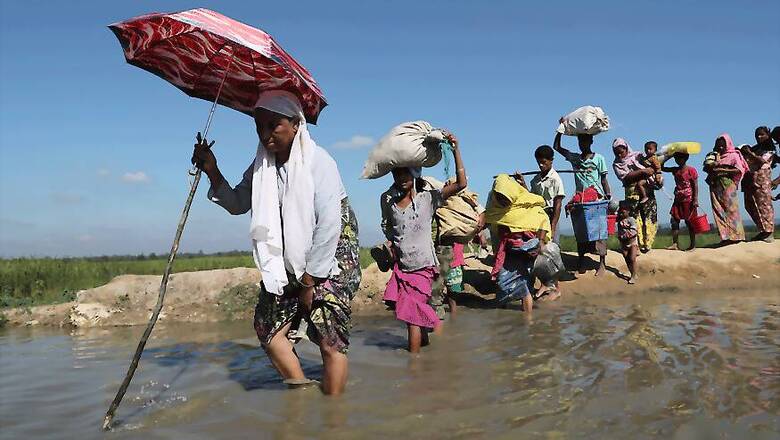
views
Yangon: Rohingya rebels on Sunday claimed responsibility for an ambush on Myanmar security forces that left several wounded in northern Rakhine state, the first attack in weeks in a region gutted by violence.
Rakhine was plunged into turmoil last August, when a series of insurgent raids prompted a military backlash so brutal the UN says it likely amounts to ethnic cleansing of the Muslim Rohingya minority.
The army campaign sent some 650,000 Rohingya fleeing for Bangladesh, where refugees have given harrowing accounts of rape, murder and arson at the hands of security forces and vigilantes.
Myanmar's military, which tightly controls information about Rakhine, denies any abuses and insists the crackdown was a proportionate response to crush the "terrorist" threat.
The insurgents, known as the Arakan Rohingya Salvation Army (ARSA), have launched few attacks in recent months.
But the army reported that "about ten" Rohingya militants ambushed a car with hand-made mines and gunfire on Friday morning, wounding two officers and their driver.
The militants claimed responsibility for the ambush in a rare post from an official Twitter account on Sunday.
"Arakan Rohingya Salvation Army (ARSA) hereby declares that we carried out an ambush against the Burmese terrorist army... at around 10:00am on 05 January 2018," it said.
The statement did not provide any more details about the attack in northern Maungdaw township.
The shadowy, poorly-armed ARSA -- whose August raids left at least a dozen dead -- says it is fighting for the political rights of the Rohingya, who have have faced systematic oppression in mainly Buddhist Myanmar for years.
Its statement on Sunday added that "Rohingya people must be consulted in all decision-making that affects their humanitarian needs and political future".
ARSA's fighting capacity at this point is unknown.
But a report last month from International Crisis Group said the organisation "appears determined to regroup and remain relevant" and may draw on desperate Rohingya refugees languishing in camps for future operations.
Any uptick in violence in Rakhine will deepen concerns about plans to begin repatriating refugees later this month.
Bangladesh and Myanmar signed an agreement in November allowing for repatriations from January 23.
But many aid groups and diplomats have expressed doubt that fearful Rohingya will agree to return to country where where they face severe discrimination from other communities and the state.


















Comments
0 comment